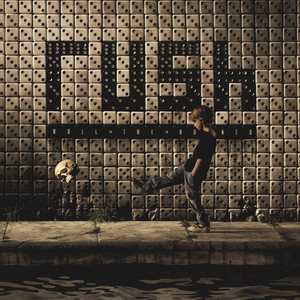Presto (1989)

In 1989, Rush was coming to the end of a very lucrative decade, having several singles popular on both the radio and MTV and a slew of top ten albums, it was a good time for the band. However, Rush is not the sort of band that finds a sound and sticks with it, they are constantly evolving. With Presto, it was time for yet another change of pace in the Rush sound. As Neil Peart said: "Things can go too far in any one direction and then we correct ourselves". The band decided to make minimal use of pianos and synthesizers, focusing on their signature power trio sound. Geddy Lee making use of a Fender bass, Alex Lifeson going back to his Gibson Hollow body, and Neil Peart ditching the electronic drums, it was like Rush had returned to the 70's, but with a modern twist.
To help propel the new direction, the band (newly signed to Atlantic Records) hired producer Rupert Hine, who was also weary of the band's keyboard filled sound. While the band still used some keyboards for texture, they were never the center of attention like what was common in recent years. The focus was now on vocal melodies, but also on guitar and bass. Peart's drums also had more life to them than on the previous album. The result was a brand new sound for Rush and the precursor for the 90's.
Despite the lack of keyboards, Presto is still a pretty soft record. It features many of the songwriting elements found on the synth era albums but with a classic instrumentation. There are a few hints to the more hard rock sound to come on songs such as Show Don't Tell and Superconductor, but for the most part it maintains the pop sound found on most of their 80's albums.
A very lyrical album, Presto contains a strong focus on vocal melodies, appealing to a pop audience. Neil Peart seemed particularly inspired for this album, working hard on lyrics. The band even decided to drop the idea of an instrumental in favor of using lyrics for Hand Over Fist.
Even though Presto cracked the Billboard top 20, it charted lower than Hold Your Fire and proved to bey ve one of their less successful records, hinting at a less commercial decade for the band. They have since expressed some regret for this album as well, though not calling any of the material an "error", but rather showing disappointment for the overall sound.

In 1989, Rush was coming to the end of a very lucrative decade, having several singles popular on both the radio and MTV and a slew of top ten albums, it was a good time for the band. However, Rush is not the sort of band that finds a sound and sticks with it, they are constantly evolving. With Presto, it was time for yet another change of pace in the Rush sound. As Neil Peart said: "Things can go too far in any one direction and then we correct ourselves". The band decided to make minimal use of pianos and synthesizers, focusing on their signature power trio sound. Geddy Lee making use of a Fender bass, Alex Lifeson going back to his Gibson Hollow body, and Neil Peart ditching the electronic drums, it was like Rush had returned to the 70's, but with a modern twist.
To help propel the new direction, the band (newly signed to Atlantic Records) hired producer Rupert Hine, who was also weary of the band's keyboard filled sound. While the band still used some keyboards for texture, they were never the center of attention like what was common in recent years. The focus was now on vocal melodies, but also on guitar and bass. Peart's drums also had more life to them than on the previous album. The result was a brand new sound for Rush and the precursor for the 90's.
Despite the lack of keyboards, Presto is still a pretty soft record. It features many of the songwriting elements found on the synth era albums but with a classic instrumentation. There are a few hints to the more hard rock sound to come on songs such as Show Don't Tell and Superconductor, but for the most part it maintains the pop sound found on most of their 80's albums.
A very lyrical album, Presto contains a strong focus on vocal melodies, appealing to a pop audience. Neil Peart seemed particularly inspired for this album, working hard on lyrics. The band even decided to drop the idea of an instrumental in favor of using lyrics for Hand Over Fist.
Even though Presto cracked the Billboard top 20, it charted lower than Hold Your Fire and proved to bey ve one of their less successful records, hinting at a less commercial decade for the band. They have since expressed some regret for this album as well, though not calling any of the material an "error", but rather showing disappointment for the overall sound.
Geddy Lee said:Some records I'm not terribly happy with the sound of: 'Presto' is a disappointing-sounding record. From a sonic point of view, it could sound a bit bigger
Despite this, Presto is not an album they've forgotten, as they play material from it to this day. They even performed the title track live for the first time on the 2011 Time Machine Tour.Neil Peart said:I wondered, 'what about Presto?' Our album from 1989 that for all of us should have been so much better than it was. That's the one that I know that if we could do one again, it would be that one, because we still love the songs from it, but you can never make magic happen.


